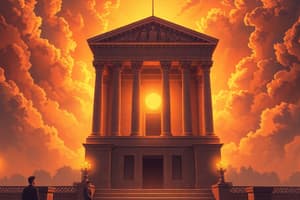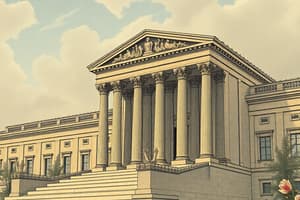Podcast
Questions and Answers
What serves as the backbone of a country according to the text?
What serves as the backbone of a country according to the text?
- Judicial bodies
- People
- Government
- Constitution (correct)
Which term refers to the basic principles and laws of a nation, state, or social group that determine the powers and duties of the government?
Which term refers to the basic principles and laws of a nation, state, or social group that determine the powers and duties of the government?
- Constitution (correct)
- Preamble
- Law and Jurisdiction
- ChaCha/Charter Change
What does a constitution embody according to the text?
What does a constitution embody according to the text?
- Health guidelines
- Rules for businesses
- Fundamental regulations and principles (correct)
- Religious beliefs
When was the 1987 Philippine Constitution ratified by the Filipino people?
When was the 1987 Philippine Constitution ratified by the Filipino people?
What does a constitution establish according to the text?
What does a constitution establish according to the text?
What does the constitution refer to according to de Leon (2005)?
What does the constitution refer to according to de Leon (2005)?
What is the purpose of the Preamble in the Philippine Constitution?
What is the purpose of the Preamble in the Philippine Constitution?
Who are considered citizens of the Philippines according to Section 1 of the Constitution?
Who are considered citizens of the Philippines according to Section 1 of the Constitution?
What is one of the important duties and obligations expected from individuals in a constitutional democracy like the Philippines?
What is one of the important duties and obligations expected from individuals in a constitutional democracy like the Philippines?
What does Article III of the Philippine Constitution, or the Bill of Rights, aim to protect against?
What does Article III of the Philippine Constitution, or the Bill of Rights, aim to protect against?
Which aspect is covered by Section 2 of the Bill of Rights in the Philippine Constitution?
Which aspect is covered by Section 2 of the Bill of Rights in the Philippine Constitution?
What fundamental right is guaranteed by Section 1 of the Bill of Rights in the Philippine Constitution?
What fundamental right is guaranteed by Section 1 of the Bill of Rights in the Philippine Constitution?
Flashcards are hidden until you start studying
Study Notes
The Constitution
- A country is run by the government, judicial bodies, its people, and most importantly by the Constitution, which serves as the backbone of the country.
- The Constitution is the embodiment of fundamental regulations and principles according to which the country, state, and its people are supposed to work.
Definition of Constitution
- A Constitution is the basic principles and laws of a nation, state, or social group that determine the powers and duties of the government and guarantee certain rights to the people.
- It is a written instrument embodying the rules of a political or social organization.
Philippine Constitution
- The 1987 Philippine Constitution was ratified by the Filipino people in a plebiscite held on February 2, 1987.
- The preamble of the 1987 Constitution states that the sovereign Filipino people aim to build a just and humane society and establish a government that embodies national ideals and aspirations.
Citizenship
- Those who are citizens of the Philippines at the time of the adoption of the Constitution are considered citizens.
- Those whose fathers or mothers are citizens of the Philippines are also considered citizens.
- Those born before January 17, 1973, of Filipino mothers can elect Philippine citizenship upon reaching the age of majority.
- Those who are naturalized in accordance with law can also become citizens.
Rights and Responsibilities
- For every right, there is always a corresponding responsibility.
- Important duties and obligations of every person living in a constitutional democracy like the Philippines include:
- Being loyal to the Republic
- Defending the State
- Contributing to the development and welfare of the State
- Upholding the Constitution and obeying the laws
- Cooperating with duly constituted authorities
- Exercising rights responsibly and with due regard for the rights of others
- Engaging in gainful work
- Registering and voting
Bill of Rights
- The Bill of Rights is Article III of the Philippine Constitution.
- It is an enumeration of the people's rights and privileges which the Constitution is to protect against violations and abuses.
- It establishes the relationship of the individual to the State and defines the rights of the individual by limiting the lawful powers of the State.
- Important rights include:
- The right to life, liberty, or property without due process of law, and equal protection of laws.
- The right to be secured in their persons, houses, papers, and effects against unreasonable searches and seizures.
- The privacy of communication and correspondence shall be inviolable except upon lawful order of the court, or when public safety or order requires otherwise as prescribed by law.
Studying That Suits You
Use AI to generate personalized quizzes and flashcards to suit your learning preferences.




